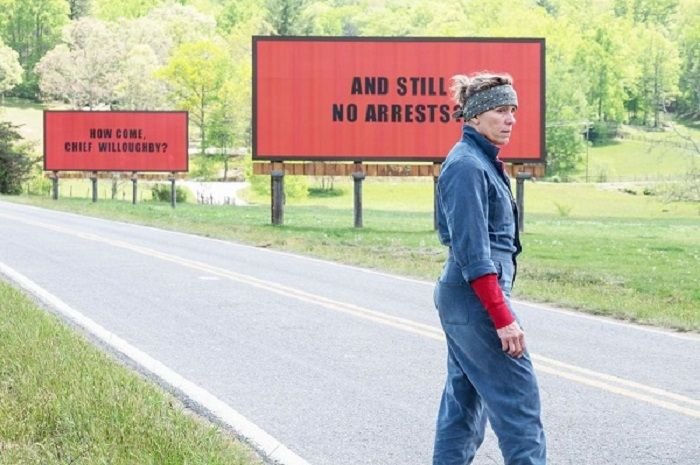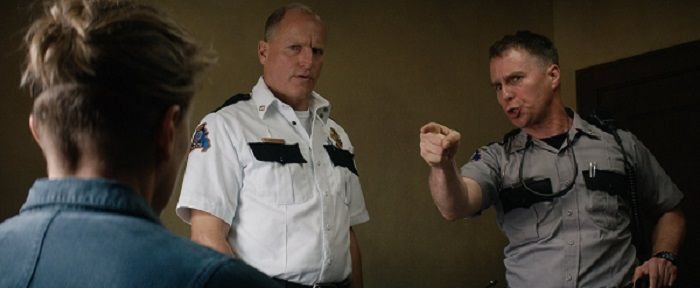Instead of writing about the pathetic dramatic qualities of Martin McDonagh's (just watch the awesome "In Bruges" or a little more scattered "The Seven Psychopaths"), I'm going directly to the wonderful "Three Billboards Outside Ebbing, Missouri". The script was written eight years ago for five weeks, while McDonagh travels through America's small cities, which gives much of the feel in the movie. Ebb is a fictional town that allows some volition, but as a feeling the place belongs somewhere in North Carolina, surrounded by tall trees of pine forests. Beautiful and tidy, like a garden in which a chopper shovel is buried, Ebb gathers villagers with a disoriented moral compass trying to co-exist.

After months of no investigation into the murder of her daughter, Mildred Hayes (Francis McDormand) has used three billboards at the entry of the city to send a message to William Woodbury - respected local police chief, telling him that the things won’t continue like this. When his deputy Dixon (Sam Rockwell), an immature mammy’s boy with a propensity for violence, intervenes, the battle between Mildred and Ebb's police is further aggravated.
Mildred Hayes is like a feminine version of a Western hero, John Wayne typing, set out on a march against the unjust and ineffective institution called the police. As a hero of the working class who does not even realize it, she’s the most punk-shaped image in the movie. Originally, McDonough wanted to shave her head to look even harsh, but they would totally repel the audience, which may well go wrong with the particular structure of the film that does not fully respect the traditional length of the three actions.

McDormand stifles the character's harsh sensitivity. If Mildred was only fierce, and she was doing everything wrong, she would be a dull character. If she had lost her only child, she could have anger and ruin, but she had a son. Mildred is unconcerned as a parent, showing sympathy when Whilbey cleanses blood, and despite the pain, finds a way to continue in a world so shaky that you can not even be sure of anything, even in your just revenge. And that's the best thing in McDonn's movie - insecurity after the tragedy. No matter how thick the darkness grows, you can’t let it get to you. Then you laugh at it or with it.
Dixon (Sam Rockwell)
-So what's going on in the nigger-torturing business, Dixon?
-It's 'Persons of color' - torturing business, these days, if you want to know. And I did not torture nobody.
I love Sam Rockwell. Perhaps one of the most underestimated American actors. He has a tremendous courage in his work that makes him interesting roles that do not always present him in an attractive way. Here he is fat, lives with his mother, wanders over Wiley, repeats what he says, reads comics, and is generally a shitty cop who just kicks off the numbers. He is also a racist, but at the end of the movie it doesn’t look like that. Part of McDonna's artistic feat is that he shows us a different path to the ugly face of human nature. Sometimes it's just a badly disguised wound. So this movie remains without a villain. He is somewhere out there, and his abominable actions have no bearing on the choices made by the characters in their hearts, the dealing with the pain and the beautiful change in them. And Dixon is disgusting and poignant, just like a man of mud, done a while ago.

Willy's marriage is perhaps the best analogue to the tone of the movie itself. In it he elegantly combine the good emotion, the creatures and the tragedy. So an episode can include love, humor, quote (as of Oscar Wilde) and death that seems unexpected but inevitable. Williams collects hard and raw goodness, which is rarely displayed on screen. At first glance, he is the bastard who is guilty of everything, but gradually the beautiful nuances begin to come out. The white man with power, the image that is so shaken in America today, is not reduced to a caricature villain. His marriage, responsibility, and personal tragedy build a sheriff's memorial image. With heart, cynicism, hope and humor, the simple story of Three Billboards Outside Ebbing, Missouri puts a finger on America's pulse and captures the restless heart thrown between racism and insane left-wing ideas dipped into the poisonous sweet path of political correctness. In this text, I decided to focus mainly on the characters, because they really impressed me (there was no room for the wonderful Peter Dinkleigh, Lucas Hedges and John Hawkes). Raw people, who are not inherently bad, are just covered with a dust of fear, insecurity, and fatigue from all the nonsense around them. In such cases, anger is not unnecessary.
"Three Billboards Outside Ebbing, Missouri" is a movie about racism, police violence and, above all, the helplessness of the tragedy that can’t fix anything. Every effort that people throw after it, all the pursuits - whether they are hanging on billboards - are an attempt to connect with others, a handshake, a cry for help. Maybe in the end, you just need a friend to send to the sunset with a rifle in the trunk and a charge of revenge that you're not even sure you will. And the most important message: It doesn’t matter whether you are a dwarf, a child, a black man, a woman or a gay. If you are a dude, you get a kick in the balls.
Magnificent review of it!
Netflix time!
Thank god my spaceship has netflix 👽
You are welcome :)
Marked to watch when released in my country.
Very nice :)
Nice review. Thumbs up. Will 100% add this movie to my watch list.
Glad to hear that :)
Oh! I watched this movie. To me it's one of the best this year. Good choice!
Yes!I think the same like you :)
Ohh Great i will watch it soon thanks for sharing
You are welcome :)
This post has received gratitude of 4.71 % from @appreciator thanks to: @godflesh.